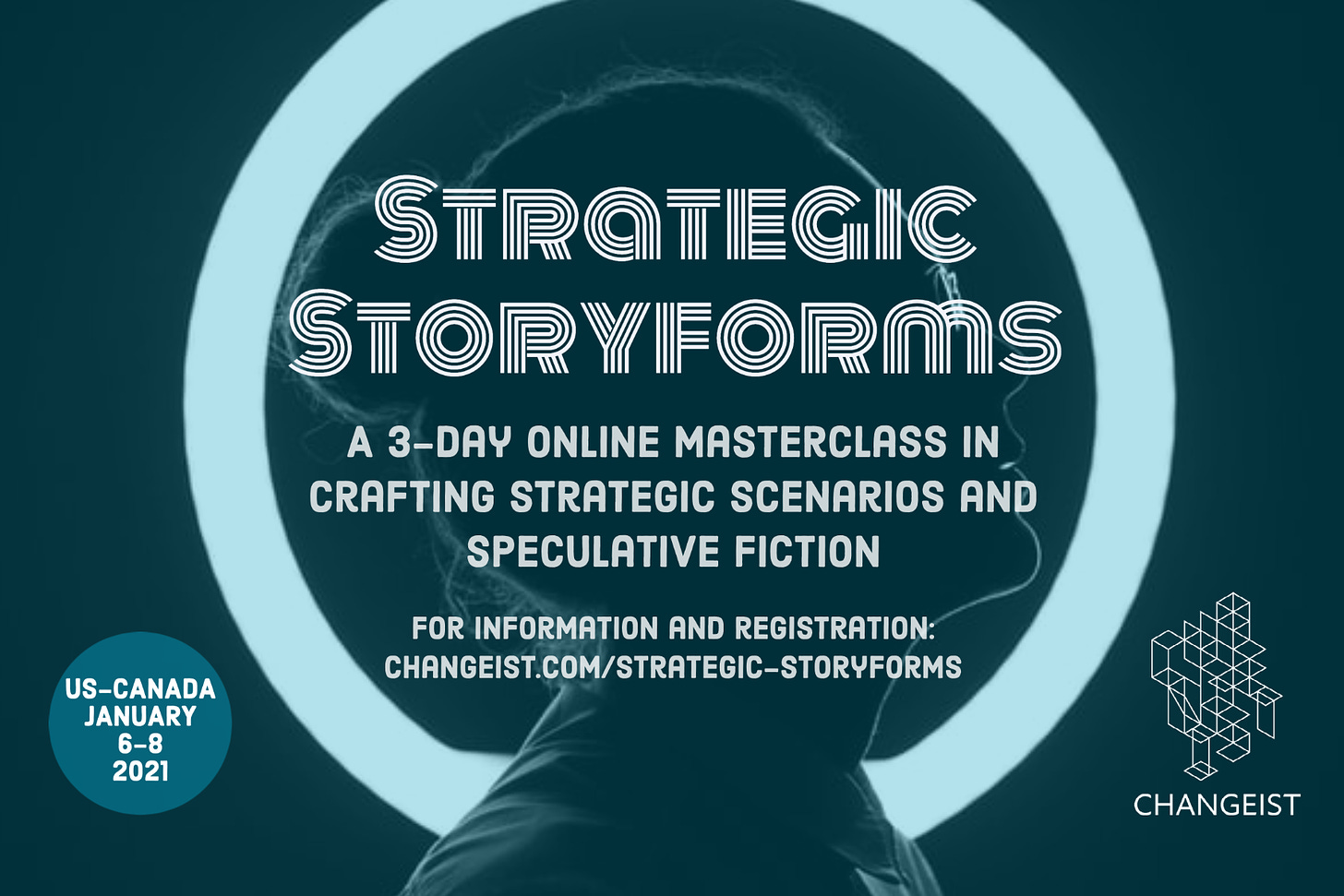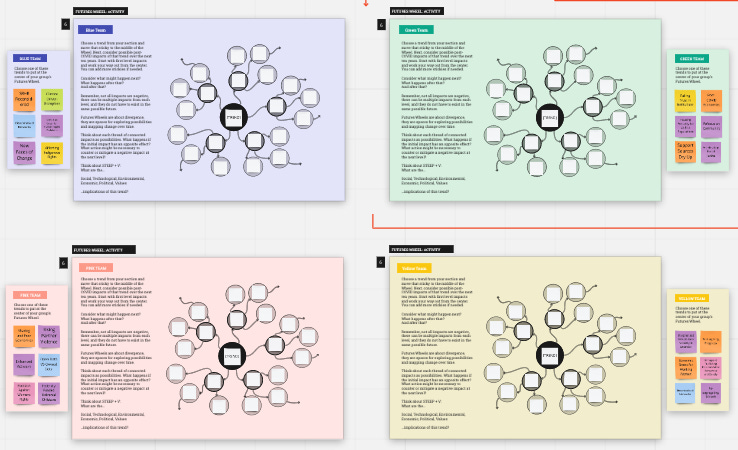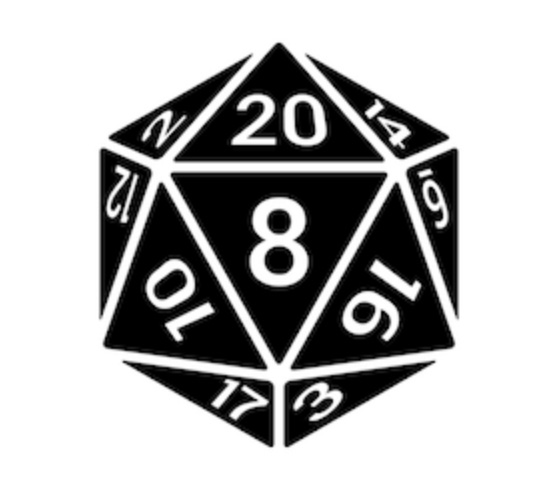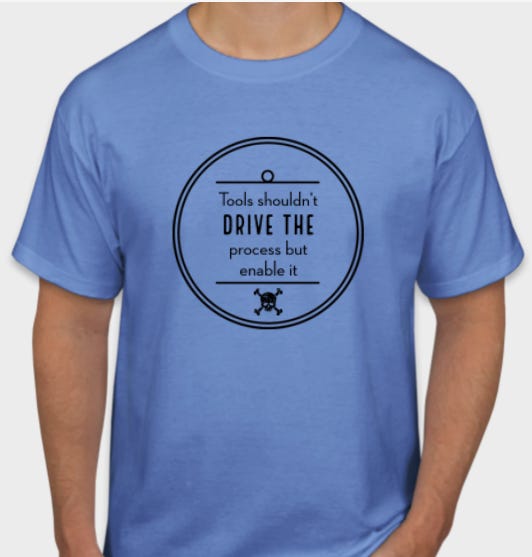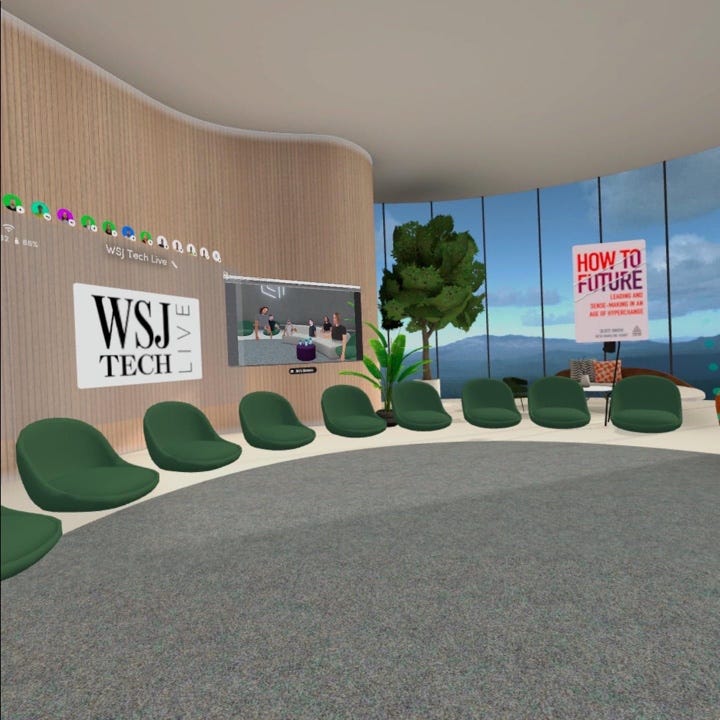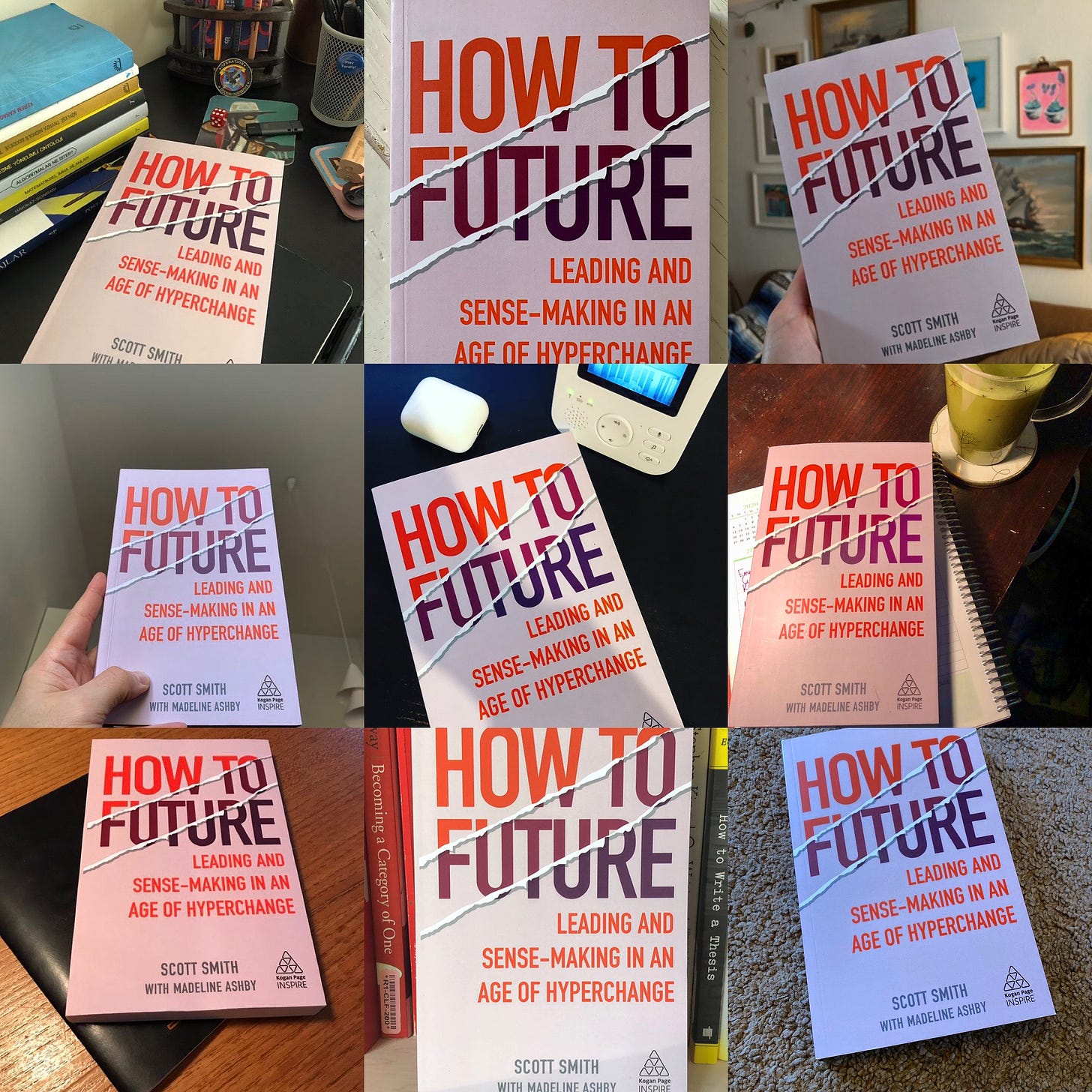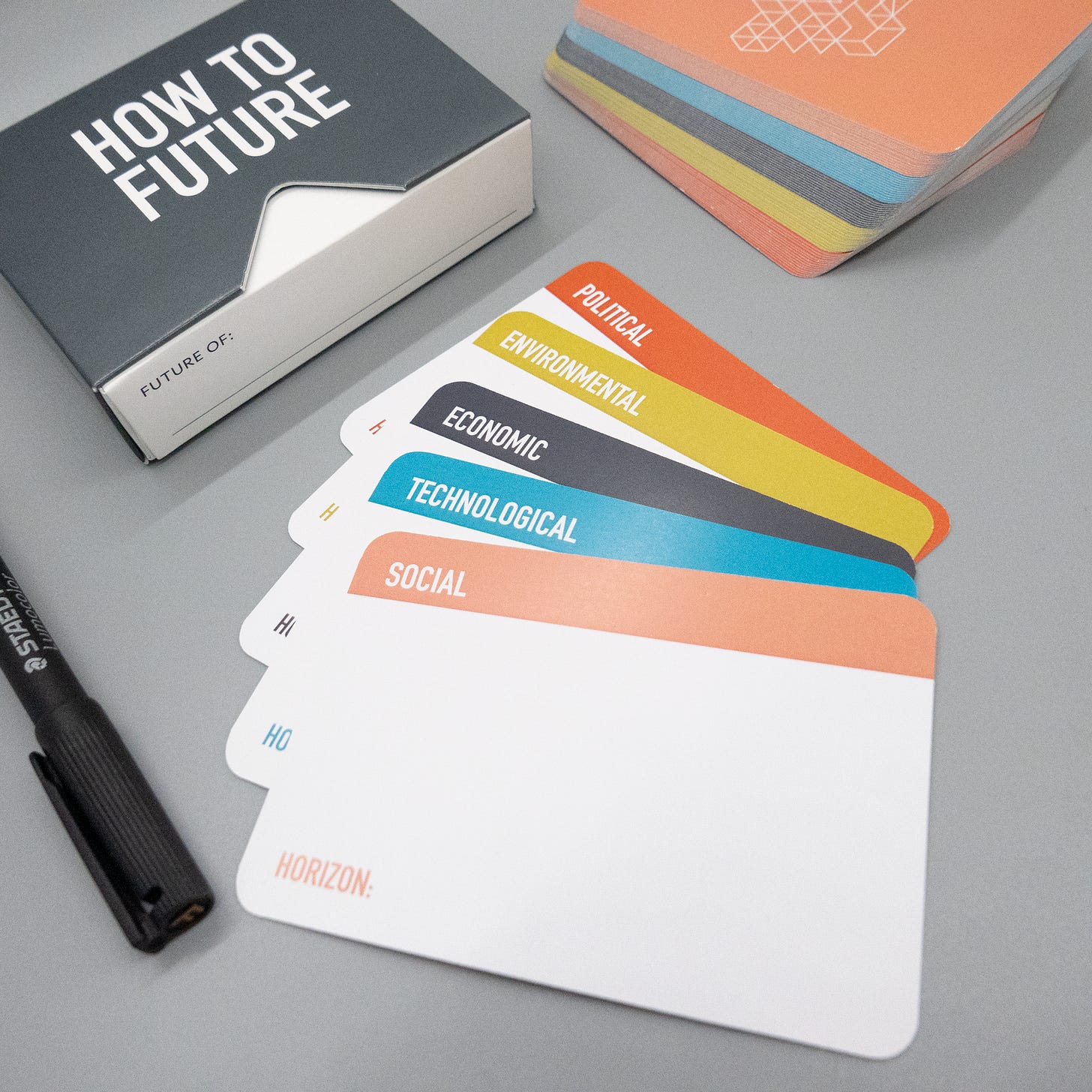Breaking Futures
It’s been a mad few months since our last update, both in terms of activity and uncertainty, but let’s hope this is the last bit of the climb toward a much, much better 2021. Thanks to all of you who have been supportive through the monumental (for us) launch of How to Future.
The book has reached all continents save for Antarctica, and we’ve had so many amazing comments back, and some great reviews as well (please visit your fav bookseller and leave a review). It’s already been used in around a half-dozen educational courses around the world—amazing considering the challenges of putting any course together at the moment, we’ve gotten pictures of the book in the wild, and have had the pleasure of stumbling on third-hand recommendations, all of which are deeply gratifying amid the toughest publication headwinds in ages.
We recap more detail below with some highlights and links, but we’d just like to collectively thank all of you who have helped boost the book in any way—it’s deeply appreciated.
So, on with the update!
New Workshops!
While we’ve been popping into the many varied events and discussions around the book, we’ve also been working on a few new workshop formats to open up to the public. Behold!
Online Masterclass: Strategic Storyforms
This workshop has resulted from the most enjoyable part of our collaboration with folks like my co-author Madeline Ashby.
One of the most undervalued but crucial parts of futuring is storytelling—or, better yet, storybuilding—the process of carefully weaving together the trends, insights, actions and dynamics of a future, developed either through structured methods and processes, or more freeform ones. To paraphrase Boromir, “one doesn’t simply jump into a story about the future,” especially when it’s being created for strategic purposes: for example as a container to hold and transmit important elements of a scenario, as a tale to contextualize a possible innovation or critical future change, or to situate an important cultural shift.
Given the work Changeist does, this is where a lot of our skills sit. Taking the same experience-based approach we use in How to Future, we’ve developed a unique 3-day online Masterclass designed to sharpen the skills of those of you who, in your professional roles, are tasked with developing strategic stories about futures. We call it Strategic Storyforms, as it covers several different forms of scenario-based narratives and speculative fiction when put to strategic uses.
Our first session, from 6-8 January, 2021, is timed for US & Canadian participants, and is delivered via a combination of Zoom, Miro and Google Docs. If the first session is a success, we will repeat the offer for EMEA and Asia timezones at a later date. At the moment, we are only registering for the full 3-day session. We currently have 24 places in the Masterclass, first-come, first-served.
You can find out more, and register, here, and we strongly encourage you to review our Masterclass FAQ before registering, as it covers ticketing, refund policy, etc.
How is it structured?
Following a half-day introduction into the role narrative forms play in engaging audiences and stakeholders, this course is built around two half-day deep dives into both scenarios and speculative fiction, with an in-depth review of uses and building blocks of each, followed by hands-on exercises developing and deconstructing these storyforms. There is a total of 10 hours of instruction, exercises and discussion.
Who is it for?
This masterclass is designed for foresight, strategy, research, communication and media professionals who want to add to their toolkit, deepen their understanding of strategic storytelling, and sharpen their thinking and communication skills. It will be useful as well for those who employ these types of scenarios and stories, and enable participants to better lead or commission their creation. It may also be valuable for those engaged in other forms of storytelling and worldbuilding.
Online Workshop: Trends & Impacts
Over the summer, Changeist had the opportunity to develop a self-facilitated workshop format for the International Women’s Development Agency (IWDA), using futures tools to explore preferable feminist futures in post-Covid 2030. We assembled a crack team of women futurists and designers to create content which reflects global trends relevant to feminist interests, the impacts of which could be explored and considered as framings for possible feminist futures over the next ten years.
It was a highly-rewarding experience and we very much enjoyed engaging with a new cohort of participants who generally have little knowledge of futures tools and how they can guide decision- and policy-making for organizations, teams and individuals. More about that specific experience can be found here.
While the IWDA convening format is free to use for feminist organizations, we’ve adapted the platform for other audiences who may be looking for a half-day introduction to basic futures thinking and tools. We use a pre-set group of critical global trends relevant to many sectors to consider implications of the trends, and learn how to critically assess next steps in light of these implications.
Designing for a fully online immersive experience, the three-hour workshop format uses Zoom, or other conference platform, plus Miro, to create an interactive space for collaborative brainstorming and inquiry. Each workshop begins with a set of trends, which groups discuss in breakout sessions. From here, teams can dive more deeply into specific trends, understanding them through different points of view, and playing out impacts and implications over time.
This format is excellent for helping non-specialist audiences participate in active conversations about the future. Groups that want to go deeper still now have a repeatable tool that can be used as a starting point for developing new scenarios afterward.
If you’d like to know more about this platform, get in touch with Susan Cox-Smith for details, costs and requirements.
Out in the World
Lockdown has had the ironic effect of getting us out of our shells and connected to more colleagues and friends, and playing with new formats for bringing that connection and conversation to the wider world. Two things have come out of this, Breaking Futures and Uncertainty Club. Here’s more about each:
Breaking Futures
We decided to start what we’re calling the Breaking Futures series, where, from time to time, we host live conversations with writers, artists and experts on future topics, and invite audiences to watch, question and engage with the panels we put together.
We held our inaugural Breaking Futures session on the Run the World platform on 5 November, two days after Election Day (now the middle of Election Month!) with three of the smartest future politics thinkers we know: futurist Dr. Jake Dunagan (Governance Futures Lab @ Institute for the Future) and speculative fiction authors Dr. Malka Older (Infomocracy, Null States, State Tectonics) and Christopher Brown (Tropic of Kansas, Rule of Capture, Failed State). We had a great, casual, free-ranging conversation that spilled over the 1-hour mark. You can watch the video from this first session here, and also find out details for future sessions on this page.
Given that we put the entire session together in under a week, from idea to execution, we had a fantastic turnout, with over 80 people registering during an altogether tense and sleepless week. Huge thanks to Malka, Chris and Jake for taking an hour of their time to share candid thoughts and carry the conversation forward. Come for the Constitutional Convention, stay for the howl. RTW has some great interactive tools, but it’s also still having some teething challenges (as many services are in pandemic time), so we may experiment with other platforms. Watch my Twitter feed for updates.
If you have ideas about future Breaking Futures, give us a shout.
Uncertainty Club
Some of you have probably heard about the new, audio-based social network Clubhouse. You may have heard good things, you may have heard other things—it’s another platform coping with fast growth in trying conditions. What it does do is provide an opportunity to escape Zoom for a while and speak to other people, in ad-hoc rooms or standing “clubs”.
I recently set up Uncertainty Club on Clubhouse along with our friend Nicholas Davis, Switzerland-based futurist, author and lecturer, to house regular conversations about the wide world of futures, scenarios, risk and, most of all, uncertainty. We’ve had two sessions so far, and there were great conversations from people all over the world. We’ve got a growing group of folks joining or following the Club so if you’re on the platform, jump in. Unfortunately, we don’t have any invites to share, as they’re scarce, but we hope to see you there if you get on board. We’ll give it a go for a while and see how the conversation progresses. Look for the 20-sided die!
How to Future Rewind
As we said at the top, we’ve had a lot of great response to How to Future, including some possible future merch ideas from folks like Gianluca here :)
We’ve also found ourselves adorning bit-space in the recent Wall Street Journal Tech Live VR reception, captured by Cathy Hackl. It’s not the first time we’ve floated over the imaginary hills above Laguna Beach (ahem).
Folks have sent in dozens of pics of the book as it arrived or sat in the sun of their studios or homes. We collected a few recently to share on Instagram. Thanks for all of these—keep ‘em coming.
Talks, Conversations and Podcasts
We’ve had a blizzard of discussions about the book, our work, the field of futures, and the possibilities futuring holds for organizations, groups and individuals around the world in difficult times.
Below are links to various sessions we’ve held, if you want to catch up on any of these discussions. We’re happy to participate in more, and welcome invitations to speak to event audiences, organizations and teams, or find other places and formats to explore the ideas inside. If you want to brainstorm what we can do together, contact us directly, or speak to Vanessa Rueda (US/Canada) or Jaini Haria (UK and rest of world) at our publisher, Kogan Page.
Links to video, audio and more:
Nesta Talks To… (Scott Smith)
Z-TOPIA (Scott Smith and Madeline Ashby)
Dubai Design Week — Design & The Future (Scott Smith)
New Cities Big Rethink (Madeline Ashby)
Sonar+D — So What About the Future? (Scott Smith)
Change Alchemist Podcast (Scott Smith)
IFTF Foresight Talks (Scott Smith and Madeline Ashby)
Hope and Sensemaking in a Pandemic (Susan Cox-Smith)
Business Extra UAE (Scott Smith)
Bernard Marr LinkedIn Live (Scott Smith)
Six Future Trends Everyone Has to Be Ready For Today - Bernard Marr w/ Scott Smith - Forbes
Still upcoming:
We’ve recorded episodes with additional podcasts that should be available in the coming week or so. Subscribe and catch us, as well as many other great conversations.
The Deep Dive Pod (Scott Smith and Madeline Ashby)
At a Distance (Scott Smith)
Exit Through the Gift Shop
If, like us, you won’t be stepping outside much to procure gifts for friends and family over the holidays, you can still support great authors who have published work this year. As we’ve said before, it’s been a hard year for writers, publishers, printers, distributors, and of course, bookstores.
Look up these fine works, buy or pre-order a copy from your favorite outlet, and spread the word, so everyone can keep bringing bright ideas and amazing stories to the world.
Creating a Culture of Innovation (non-fiction, pre-order) — Alexandra Deschamps-Sonsino
…and Other Disasters (short stories) — Malka Older
ReV (fiction) — Madeline Ashby
Failed State (fiction) — Christoper Brown
Ghost Hardware (fiction) — Tim Maughan
What Can a Body Do (non-fiction) — Sara Hendren
Lurking (non-fiction) — Joanne McNeil
Ghost Road (non-fiction) — Anthony Townsend
Practical Guide to Experience Design (non-fiction) — Shannon E. Thomas
Manifesto Handbook (non-fiction) — Julian Hanna
And don’t forget How to Future Cards as a stocking stuffer for the futurist-to-be in your world. There are still a few decks left, and there’s still time to ship for a Secret Santa gift (just saying). Oh, and pick up a few decks of Artefact Cards on your way out.
Take Care
That’s it for this bumper round-up. As always, we love to hear from you. 2021 will be a year of creativity for us, so if you have an idea you would like discuss, get in touch. Until then, take care of yourselves and your loved ones, think about how you can support new futures. Here’s to a brighter year ahead.
-Scott
+++
If you want to follow the discussion, find us on Twitter, Instagram, Medium, or the original formula Web. And feel free to forward this message.
